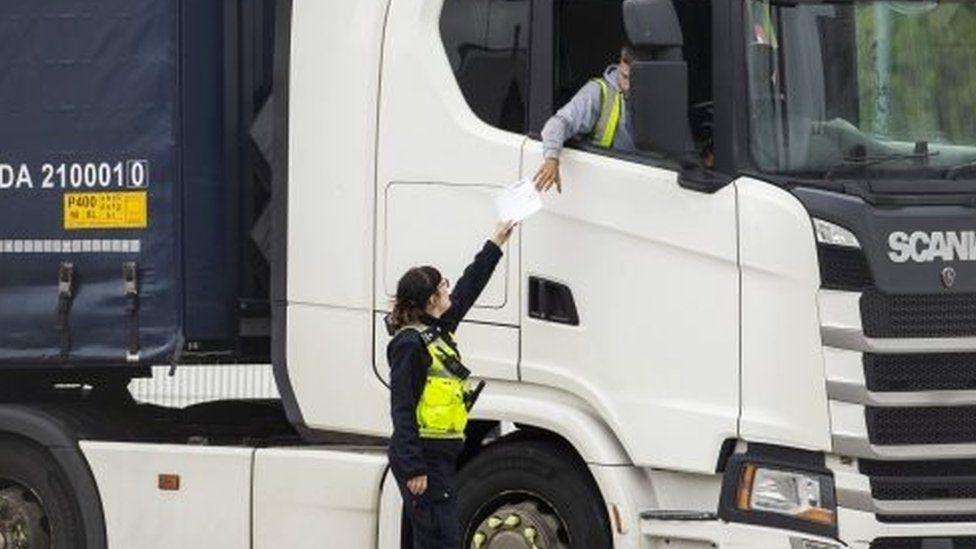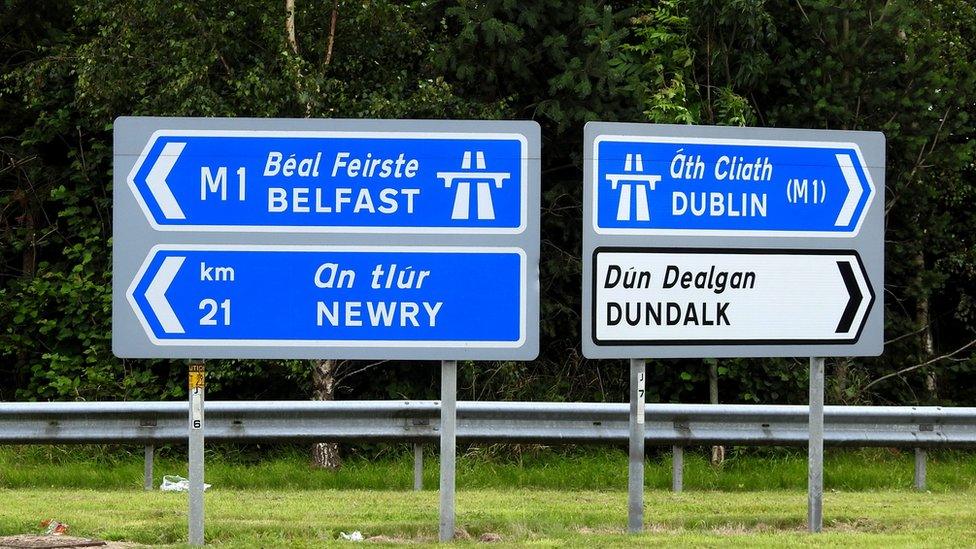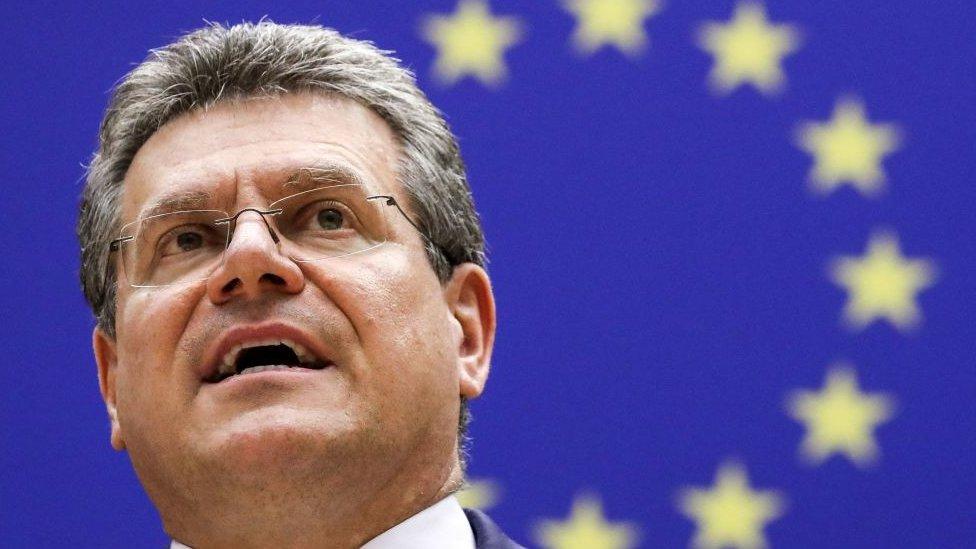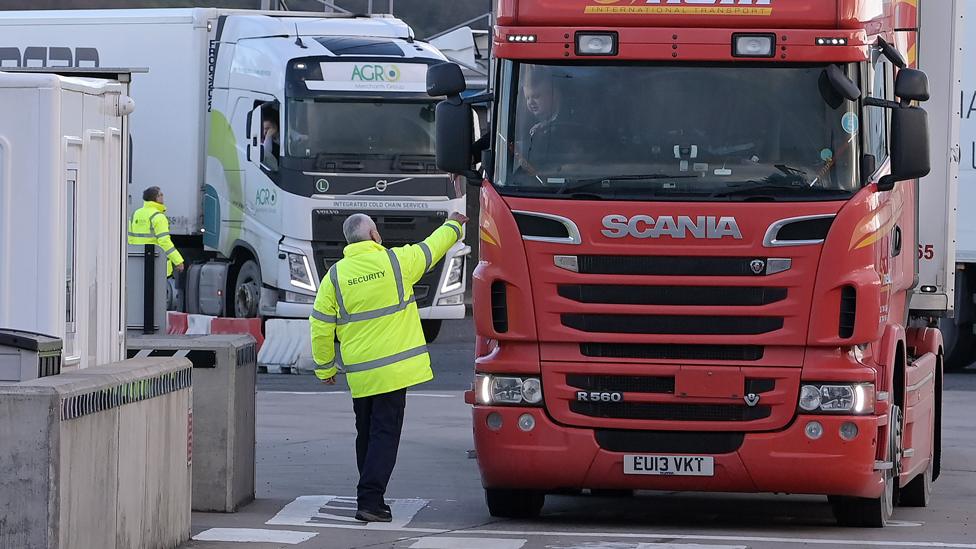NI Protocol: Three-page certificate for GB lorries entering NI - EU
- Published
'Let's minimise the burden'
Goods lorries entering Northern Ireland (NI) from Great Britain would have to complete a three-page certificate under EU plans to simplify post-Brexit trading arrangements.
Chilled meat consignments would need a separate three-page document.
The European Commission published details earlier about the certificates, external initially proposed last year.
The government said the proposals would lead to more checks and controls, making the situation worse.
A spokesperson for the prime minister said: "The EU's proposed approach, which doesn't differ from what they have said previously, would increase burdens on business and citizens and take us backwards from where we are currently."
UK plans to scrap parts of the NI Protocol, published on Monday, would lead to a "mountain of paperwork" for firms, the European Commission claimed.
The protocol is the part of the Brexit deal which keeps Northern Ireland in the EU's single market for goods.
It prevents a hard border with the Republic of Ireland, but it means checks on some goods arriving into Northern Ireland from other parts of the UK - a situation opposed by unionists in Northern Ireland who argue it creates a trade border in the Irish Sea and extra bureaucracy and costs for firms.
The European Commission tabled proposals in October 2021 to reduce the post-Brexit checks on goods and medicines arriving into Northern Ireland from the rest of the UK.
At the heart of the plan was the idea of an "express lane", to allow for a reduction in the level of paperwork and checks on goods coming into and remaining in Northern Ireland from GB.
But the proposals were publicly rejected by the UK in May.
London said they did not address the core problems presented by the protocol, would require more checks and controls than under the current 'grace period' regime, and would result in the disappearance from Northern Ireland supermarket shelves of certain products.
Draft legislation from the UK government this week to overturn parts of the protocol includes the use of a green lane for goods arriving into Northern Ireland from GB, with minimal paperwork and no checks, and a red lane for GB goods moving through NI into the Republic of Ireland and the wider European Union.
Another part of its proposal was a dual regulatory regime meaning goods produced to both UK and EU standards could circulate in Northern Ireland.
Businesses in Northern Ireland would be able to produce goods that met UK standard, EU standards or both.



The EU has been clear that these proposals aren't substantively new but more of a "fleshing out" exercise.
Most of the new details are related to their customs proposals.
That includes setting out the 21 pieces of customs information which would be required as part of the "super reduced data set".
On agri-food they spell out that a new trusted trader scheme would apply not just to supermarkets, but a wide range of businesses across retail and hospitality.
However there remains a very large gap between what the EU is proposing and the UK's ultra-light touch approach to GB goods which are staying in Northern Ireland.

At a press conference initiating legal action against the UK on Wednesday, European Commission vice president Maroš Šefčovič said the UK plan would bury businesses under a "monstrous" amount of paperwork.
"Our proposals are all about simplification, in stark contrast to the dual regulatory regime proposed by the UK," he said.
"A dual set of rules would lead to a mountain of paperwork and bureaucracy, and [would] bury a small business in Northern Ireland who wants to benefit from access to both."

The protocol avoids a hard border on the island of Ireland
The commission on Wednesday published two papers - one on customs and a second on plant and agri-food-related issues - giving more detail on its proposals from October.
On customs, the EU is proposing:
A potentially expanded trusted trader scheme to include firms in GB bringing goods into NI
The use of a single form with 21 data fields without the need for further declarations
The use of a single monthly form setting out customs transactions
On sanitary and phytosanitary (SPS) issues, the controls to protect animal, plant or public health, the EU is proposing:
A single, three-page document for a lorry load of mixed goods, bound for Northern Ireland retailers from GB - the certificate would show goods comply with EU SPS requirements
For consignments of chilled meats, such as sausages, a separate three-page document would be needed
Ingredients for the goods would have to originate in GB, or have been brought into GB from the EU
Goods bound for the hospitality sector, schools, canteens, and supermarket distribution centres would have to comply
Consignments would have to have a label which states: 'Products for sale only in the United Kingdom'
Documentary checks would be compulsory, but could be carried out electronically.
Identity and physical checks would be cut by more than 80% compared to the mandatory checks on the same goods entering the EU
Consignments must be presented at border control posts in NI, with monitoring and surveillance measures in place to ensure movement of goods to final location in NI
EU representatives must be given access to UK IT customs systems
Mr Šefčovič said the EU proposals were "oven-ready" and would offer stability and legal clarity to firms.
The UK said the EU proposals would "result in further burdens than is the case now".
On customs, it said:
Paperwork would still be burdensome, with only limited access to the trusted trader scheme
Some of the proposed benefits are already in place
No facilitations for parcels, meaning post and parcel movements would face customs declarations and tariffs
On SPS, it said:
The claim that a supermarket lorry only needs three pages of paperwork "does not hold up ", as "they would also need to provide customs and safety and security declarations"
Movement of certain plants would remain prohibited, and other goods would need specific certificates, such as chilled meat and sausages
Many operators are excluded, such as food processors and goods not of UK or EU origin
The proposals also do not address the movement of pets
Related topics
- Published13 October 2021

- Published16 October 2021
